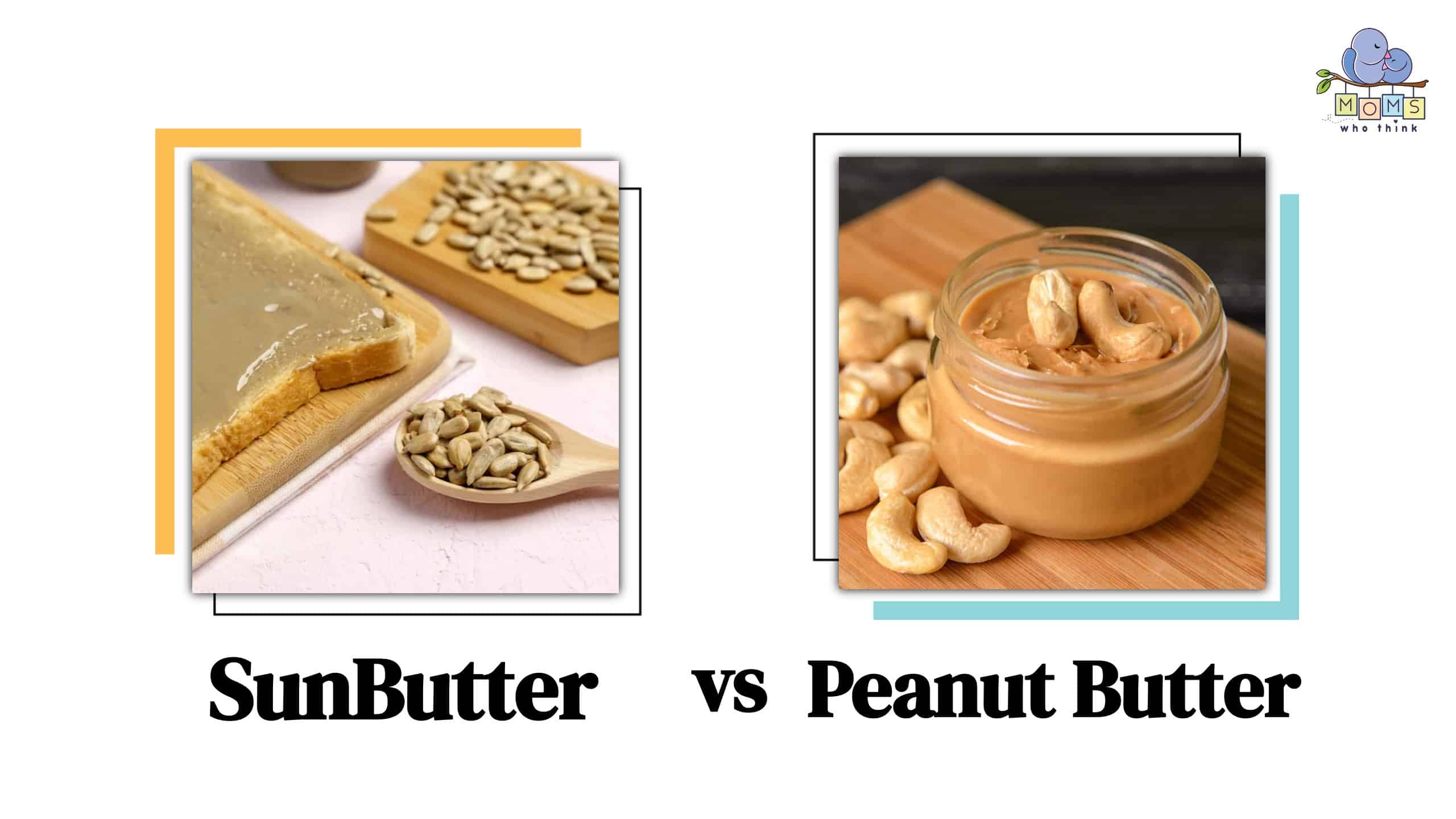While the most obvious difference is that one is made from peanuts and the other is made from sunflower seeds, the real crux of the argument of peanut butter vs. SunButter comes down to the nutritional aspects. While SunButter may have more vitamin E and iron, peanut butter has less fat and sugar.
Let's dive into how peanut butter compares against sunflower seed butter!
Peanut Butter vs. SunButter: What Is the Difference?
The primary difference between peanut butter and SunButter is that SunButter is made from sunflower seeds while peanut butter is made of ground peanuts. While both are spreadable nut butters, peanut butter has a rich, robust flavor while SunButter (and other sunflower seed butters) is milder and earthier in flavor.
SunButter is a popular substitute for those with peanut allergies. As far as which nut butter is healthier, there are pros and cons between each nut butter. Peanut butter contains a good amount of protein, healthy fats, and fiber whereas SunButter typically has more vitamin E and less saturated fat.
Peanut Butter vs. SunButter: How They’re Made
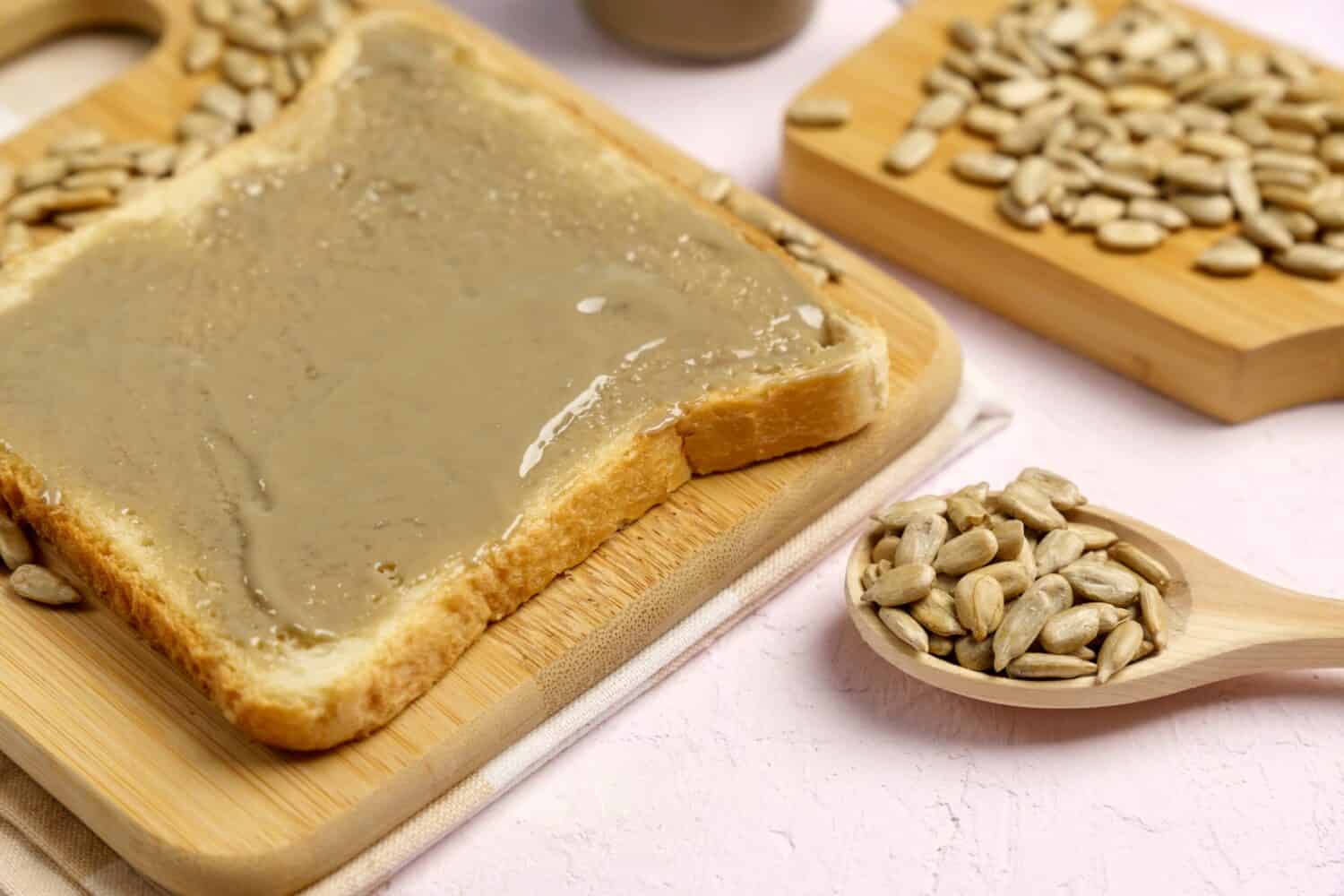
SunButter offers a smooth texture and it tastes great on toast.
©darksoul72/Shutterstock.com
Different ingredients mean that the products will be made in their own unique way. SunButter is made from sunflower seeds, sweetener (honey, maple syrup), oil, and salt. The oil is added to produce the creaminess of the butter. The syrup, honey, or other natural flavors help to elevate the taste.
- The must-have convenient reference guide for every home cook!
- Includes more than 8,000 substitutions for ingredients, cookware, and techniques.
- Save time and money on by avoiding trips to grab that "missing" ingredient you don't really need.
If you make SunButter, but it tastes too much like sunflower seeds, then you can roast the seeds. Then, you’ll get that roasted undertone like with peanut butter. You can also add salt to give it more kick. The spread will be thick and creamy and generally softer than peanut butter.
Peanut butter is made from shelled roasted peanuts that are ground down into a fine paste. In addition to the peanuts, there will also be salt, sweeteners, and emulsifiers to modify the taste. Regardless of what you do, you’ll still get that strong peanut flavor. Peanut butter comes in a larger variety of flavors, including chunky, creamy, organic, and more.
Peanut Butter vs. SunButter Nutrition: Fats, Calories, and Vitamins
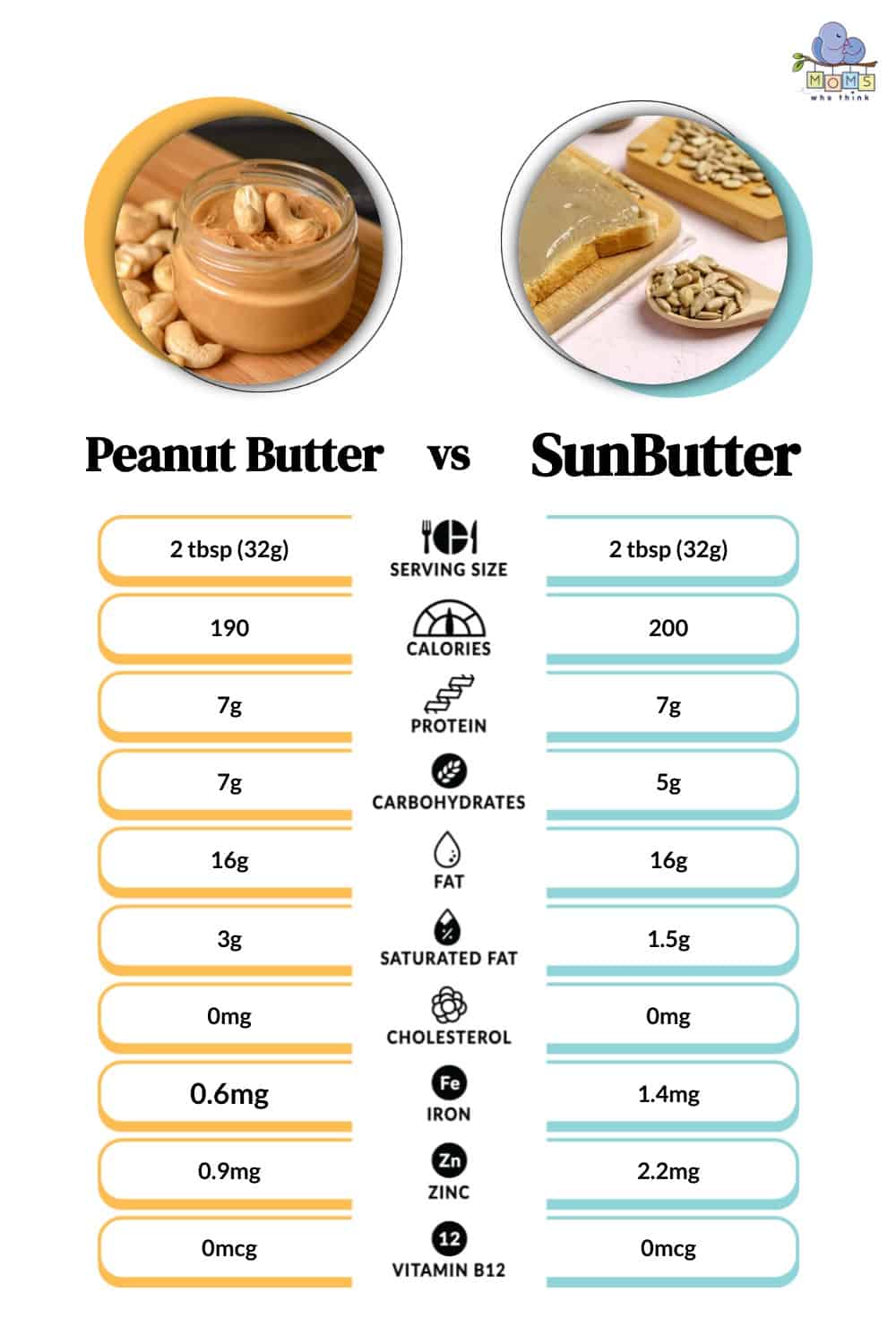
A nutritional comparison of SunButter and peanut butter (nutrition varies by brand)
©
When comparing the products, the largest difference is the nutritional aspects. Keep in mind that both peanut and SunButter are very healthy. They’re just healthy in different ways.
Peanut Butter
Make no mistake. Peanut butter is exceptionally healthy. It includes many essential nutrients, including magnesium, vitamin E, iron, selenium, and vitamin B6, among others. Its main claim to fame is that it packs a lot of fiber, which helps you to feel fuller for longer, so you can manage your weight. The peanuts in this product are also full of unsaturated fats, which is key for lowering your cholesterol and good for your heart health.
Then there are the biotin or B vitamins that help to keep your hair smooth and silky. Vitamin E nourishes your skin and protects you from dangerous UV rays.
Peanut butter is a very healthy snack. You can use it on your sandwiches, as an ingredient in larger recipes, or just as a snack. That means that you can eat it a lot, and it will prevent weight gain while also keeping your blood sugar under control.
SunButter
Some nutritionists say that SunButter wins in the battle of peanut butter vs. SunButter when it comes to health benefits. SunNutter is packed full of protein. Each serving has about seven grams of protein, and that’s enough to ensure that your muscles stay strong, that you’re fuller for longer, and that you don’t eat more than necessary.
There’s also a ton of vitamin E in SunButter which is great for balancing your cholesterol levels. Also, it reduces how quickly you age and reduces cell damage along the way. Most of all, vitamin E improves your immune system, which prevents illness. Then there’s the magnesium that relieves muscle spasms, helps you to stay energized, and, best of all, helps us to get sleep at night.
SunButter also has all of the healthy fats that our bodies need. While trans fats can make you feel slow and sluggish, healthy fats help to lower cholesterol and inflammation.
All in all, SunButter provides the following nutrients:
- Protein
- Phosphorus
- Vitamin B6
- Zinc
- Niacin
- Iron
- Copper
- Vitamin E
What Are Substitutes for Peanut Butter?
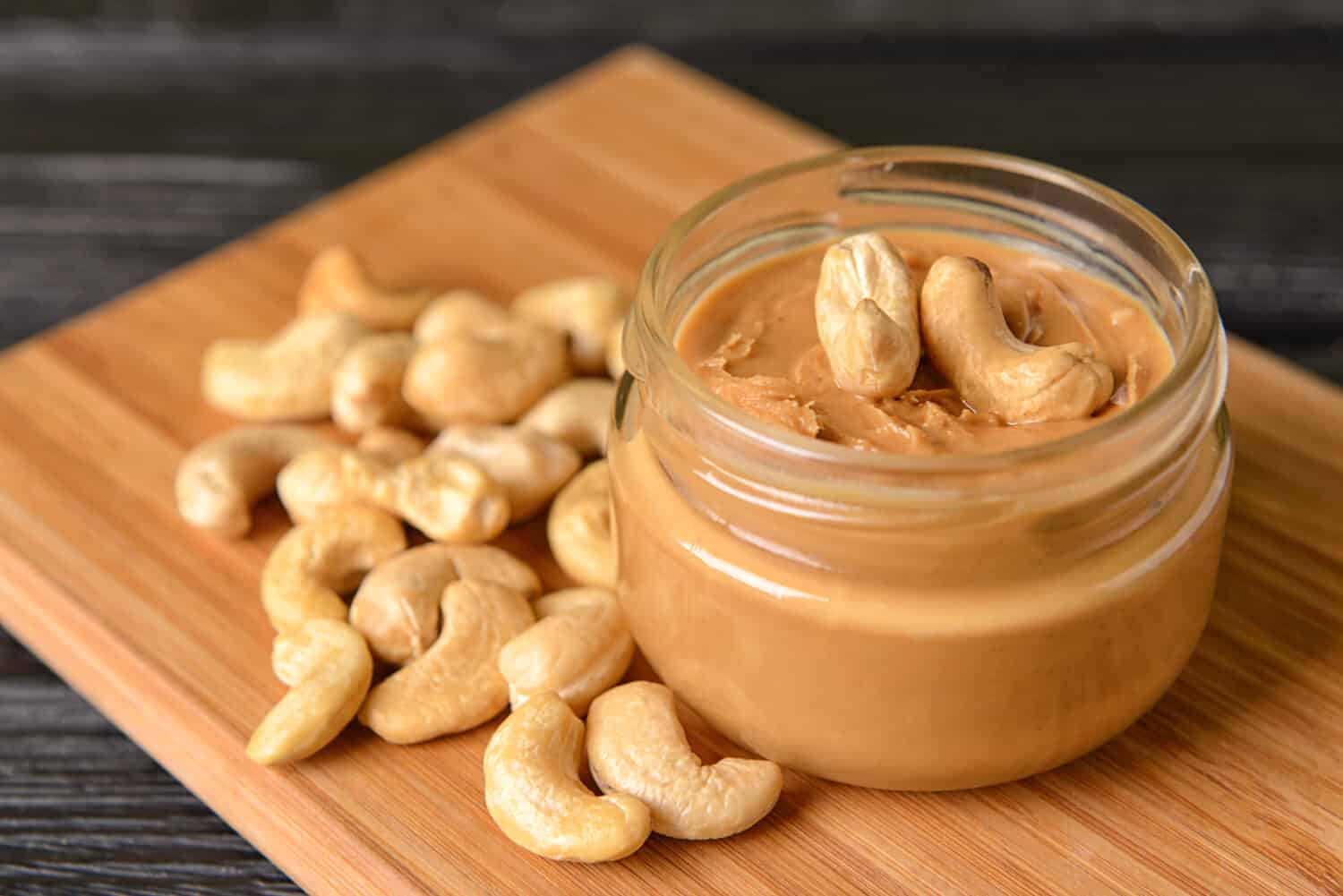
Cashew butter is a creamy substitute for peanut butter.
©Pixel-Shot/Shutterstock.com
If you love the texture of peanut butter, but you’re looking to try something new, then there are multiple substitutes you may enjoy instead.
Almond Butter
If you’re not allergic to tree nuts, then almond butter is a great substitute. It has a similar nutty taste, and in many cases, it’s actually healthier than peanut butter. It has more fiber, calcium, vitamin E, and monounsaturated fats.
Pea Butter
While it may sound like peanut butter, pea butter isn’t made with nuts at all. Pea butter is made from brown peas, so you get a similar texture and a good spread, but no allergens, and it’s gluten-free.
Soy Butter
People often recommend soy butter because the soybeans it’s made with are also roasted, just like the peanuts in peanut butter. There’s also a lot of protein and omega-3 fats, so it’s very healthy.
Cashew Butter
Like peanut butter, cashew butter is great for spreading and baking, and it’s a great source of magnesium, which helps with blood pressure. Some experts say that consuming up to 64 grams of cashews per day can lead to reduced cholesterol levels.
- The must-have convenient reference guide for every home cook!
- Includes more than 8,000 substitutions for ingredients, cookware, and techniques.
- Save time and money on by avoiding trips to grab that "missing" ingredient you don't really need.
Walnut Butter
As you may imagine, walnut butter has a nutty flavor that’s also very spreadable. Consuming this butter provides dietary fiber, healthy fats, and the highest omega-3-to-omega-6 ratio of all tree nuts. Walnut butter is great with smoothies, on toast, and in all the other ways that you’d also enjoy peanut butter.
Hazelnut Butter
Don’t confuse hazelnut butter with products like Nutella, because natural hazelnut butter, which is less processed, is very good for you. It’s rich in monounsaturated fatty acids, magnesium, calcium, iron, and zinc. They may also work as an inflammatory.
Pecan Butter
It tastes great on bread and as part of recipes in addition to being loaded with nutrients. It has zinc, magnesium, and only four grams of carbs per two tablespoons. In fact, it has a lower carb count than peanut butter, and it tastes really great.
Coconut Butter
Made from shredded coconut meat, coconut butter has a slightly stiffer consistency than peanut butter, but it can be very delicious. It also contains medium-chain fatty acids, which help to support weight loss.
What Are Substitutes for SunButter?
If you’re interested in SunButter because it takes the nuts out of the equation, then you’ll be happy to know that there are many other nut-free substitutes that are delicious and nutritious, while providing a similar texture.
Tahini
Many people who like SunButter can also tolerate tahini (sometimes called sesame seed butter), which is also a seed butter. Since there are no nuts, it’s safe for people with allergies, and it offers a similar texture and a nice spread.
Almond Butter
If you like the flavor of SunButter, but you’re looking for a bit more, then almond butter is similar but with more of a flavor punch. The texture is almost identical to SunButter.
Peanut Butter Recipes
In the mood for some peanut butter goodness? Then try these amazing recipes:
Print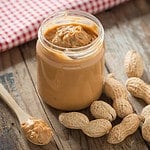
Peanut Butter Pie
Ingredients
- One 9-inch frozen unbaked pie shell, baked and cooled (recipe here)
- 1 1/3 cups creamy peanut butter
- 1/2 cup half-and-half
- 2/3 cup plus two tablespoons powdered sugar
- 1/4 cup butter, softened
- 1/2 teaspoon vanilla
- 1/3 cup granulated white sugar
- One large egg, room temperature
- 3 ounces semisweet chocolate, melted and cooled
- 1 cup cold whipping cream
- Two tablespoons chopped peanuts
Instructions
1. Mix peanut butter with half-and-half and 2/3 cup of powdered sugar until smooth in a small bowl.
2. Spoon into prepared pie crust.
3. Beat 1/3 cup granulated white sugar with butter and vanilla until fluffy. Add the egg and beat until light and fluffy, then beat in the melted chocolate.
4. Spread the mixture over the peanut butter filling. Refrigerate 1 hour.
5. Beat whipping cream with the remaining two tablespoons of powdered sugar until peaks form. Spread on top of the pie, garnish with chopped peanuts.
- Waffle Cone S’mores – Peanut butter chips + mini marshmallows = delicious.
- Chocolate Peanut Butter Fudge – These gooey treats will keep the kids coming back for more.
- Buttermilk Corn Fritters – Spread some peanut butter on these fritters for a great treat.
- Peanut Butter Cookies – You can’t go wrong with this classic recipe.
Conclusion
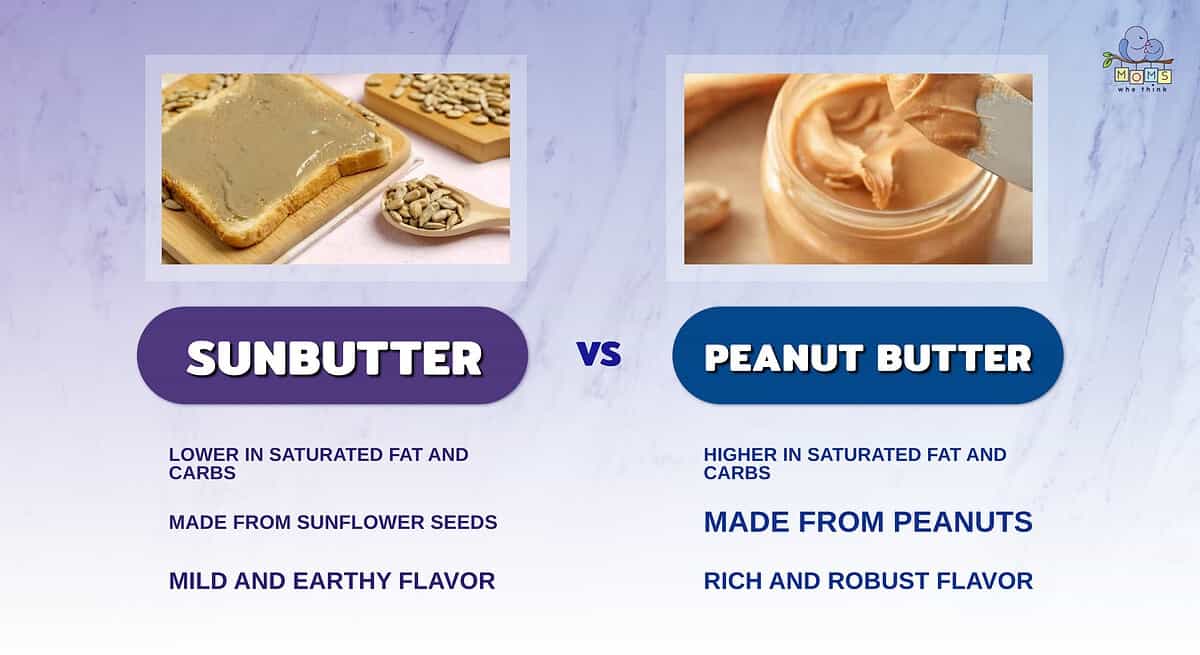
- SunButter uses sunflower seeds in its production, while peanut butter uses peanuts.
- Both spreads have a distinct taste. SunButter tastes mild and earthy, while peanut butter is rich and robust in flavor.
- Peanut butter is higher in saturated fat and carbs, making SunButter a great choice for those on a diet.
As you can see, there are a fair amount of differences in the peanut butter vs. SunButter debate, but both products are delicious and incredibly nutritious. Consider incorporating one or both into your diet. You won’t regret it.
- The must-have convenient reference guide for every home cook!
- Includes more than 8,000 substitutions for ingredients, cookware, and techniques.
- Save time and money on by avoiding trips to grab that "missing" ingredient you don't really need.
